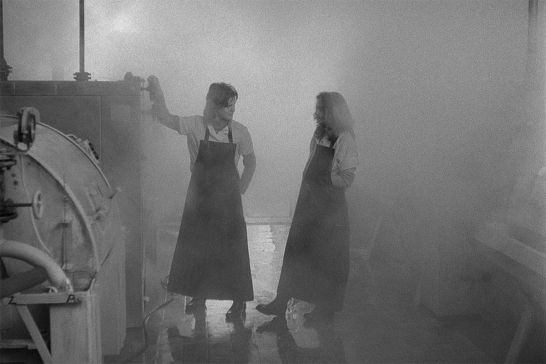27 October 2019: Jürgen Böttcher: A New Way of Seeing

Image credit: Wäscherinnen©DEFA-Stiftung/Horst Sperber
Three of Many (Drei von vielen), Jürgen Böttcher, 1961, 33 min
Blast Furnace Removal (Ofenbauer), Jürgen Böttcher, 1962, 15 min
The Party Secretary (Der Sekretär), Jürgen Böttcher, 1967, 29 min
Laundry Women (Wäscherinnen), Jürgen Böttcher, 1972, 23 min
All in German with English subtitles. Total Runtime: ca 100 min
"Part one of programme one at Close-Up opens with Böttcher's first commissioned film: Three of Many, which because of its primitivism and formalism of paintings depicted; behaviour of the people and the milieu: a truck driver/painter sitting in a rocking chair listening to jazz whilst contemplating one of his paintings; a bath tub situated in the living room and even a thistle in a water glass on a sill (real life locations were used rather than studio sets), were all detested by the functionaries and the film was banned. However, the banning was more likely to do with do with developments happening off the screen, than on it. "… all the artists featured in the documentary (including Böttcher) had submitted paintings for the controversial exhibition Junge Künstler (Young Artists), which had opened at the Academy of Arts in East Berlin in the summer of 1961. Although organized by Fritz Cremer, then the head of the Academy’s department of fine arts, this exhibition had been singled out for particularly harsh criticism in the East German press because of the allegedly “formalist tendencies” of some of the works on display. On the occasion of his visit to the exhibition, Alfred Kurella is even reported to have personally removed a number of pictures he found particularly offensive. In 1960, a similar exhibition in the Berlin gallery Konkret, also organized by Cremer, had been closed prematurely on similar grounds." (Kraft Wetzel)
What was revealed then, was a vibrant counter-culture; the existence of a grassroots art scene in the GDR, one which, precisely because of its amateur basis, was able to elude the Ministry of Culture’s control. Attempts to persuade ordinary people to take up art and writing such as banners displayed in factories and work places emblazoned with, "Workers - take up your pens!", inspired instead the unforeseen opposite – the development of autonomous and potentially oppositional artistic groups. Böttcher’s film then, was received as an alert, unwittingly rang bells and… "served as an unwelcome reminder that, once the genie of artistic creativity had been let out of the bottle, the state would struggle to regain its existing grip on cultural production." (Klaus Wetzel)
It was only in 1988, after it had eventually been put on general release in the GDR, that it received a first public screening in Edinburgh. Böttcher states…"After Three of Many was banned l became quite depressed. It was amazing that they let me continue at work as a filmmaker at all. Of course, one had to make amends, had to prove oneself…"
He did so in his following work: Blast Furnace Builders, the first explicit observation of a work process in Böttcher’s oeuvre. Much admired by state officials and awarded the Silver Dove in the important International Leipzig Documentary and Short Film Week, the implicit focus of the film is an important propagandistic theme of the GDR; workers exceeding a planned objective through camaraderie, Herculean work and meticulous planning.
Paradoxically, there were a number of GDR directors who, like Böttcher, strove for an un-prejudiced perspective partly perhaps because they held utopian views on socialism, but also as a result of their ideas about documentary film-making culled from encounters (Leipzig Documentary and Short Film Week provided an important yardstick for comparisons), with classics of documentary cinema. They were also inspired, to a decisive degree, by the radical changes which documentary film itself was undergoing at the time, catalysed by cinema direct and cinema-vérité (Leacock, Marker, Rouch, Drew, Cassavetes); both movements were engaged with directly capturing reality, to represent it truthfully and to question the relationship of reality with cinema.
The third film: The Secretary, Böttcher regarded as a penance after Three of Many was banned. It is out of the obvious discrepancy between the ideal and the reality of most GDR work situations that this film draws its subversive tendencies.
Programme 1, Part 1 ends with Laundry Women, Böttcher engages directly with the workplace; sound is used in layers and to punctuate the image. Women at ease with themselves and having fun with Böttcher’s line of questioning; at the same time Böttcher gives serious voice to their concerns raised." – Diana Mavroleon
Part of the Goethe-Institut's season on Jürgen Böttcher, presented in collaboration with Close-Up and King's College London.
Programme notes written by Diana Mavroleon, London 2019. Programme notes references: Claus Loser.
Diana Mavroleon works with experimental and documentary film; a programme maker for Resonance Radio, a founder member of European Media Arts Network and a correspondent for S.E. Asia. She is currently researching a documentary feature on: "The impact of globalization on the hereditary musicians of the Thar Desert in Western Rajasthan". Diana is also a qualified bio-dynamic gardener and landscape/garden designer.